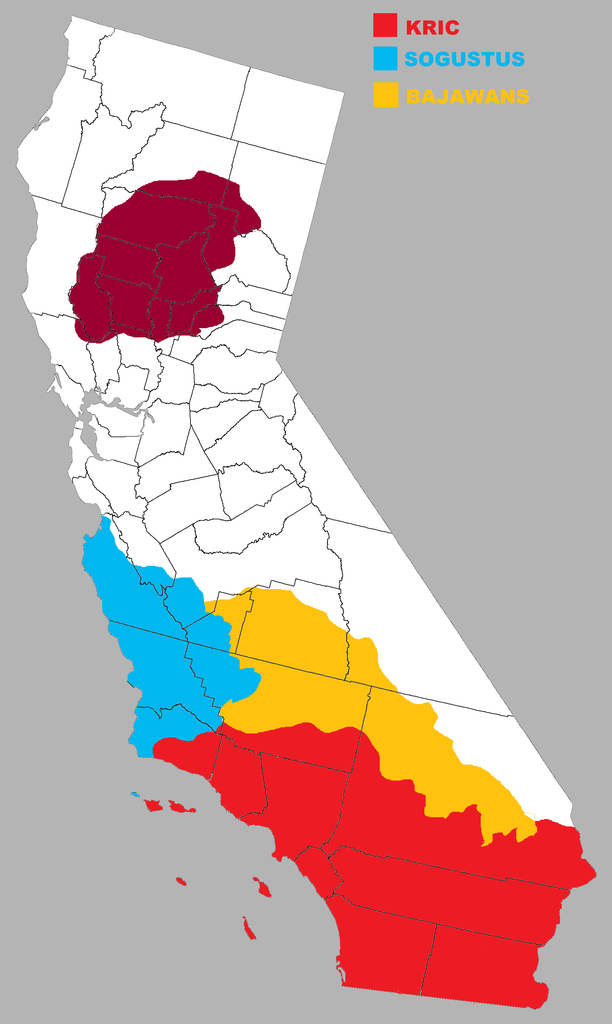Post by The Kric Peoples on Aug 6, 2016 0:19:26 GMT -5




The New Nations of the Free Kric Land
The Krics, The Bajawans, and The Sogustus
Before this incident, none knew of the true nature of the Krics. There were indeed stories regarding them as savages, but no true scientific research. This was, of course, because the Kric peoples were strictly isolationist. Their language, customs, and ideas did not leave their land. Embedded so thoroughly into their culture was the resistance to the outside world that it was considered a shame for an arrow shot at an outsider not to be returned to the Kric's land. Until this historic occasion, no single human besides that of the Kric knew a single word of the Kric language. Nothing was known of their fishing-focused economy, nor of their agricultural prowess and their remarkable construction of buildings such as aqueducts, churches, and tombs despite an otherwise lacking technological background.
On the date of February 22nd of 1841, a group of tan-skinned folk dressed in glimmering fishscale robes approached a Franquebec frontier town. At first, they were met with hostility, until they finally managed to communicate that they desired an interpreter. Quickly this reached the attention of higher scholars, and they soon found out that this group of people called themselves the Sogustus. These weary folk told a tale of treachery, political tension, and an unfortunate collapse of the unifying Kric empire. They told that a rebellion occurred among the ethnic Bajawans, who believed that the world should no longer be isolated and that trade with foreign powers would benefit. The Krics, intensely insular, scoffed at the request, demanding that the Bajawans step down from their right to a council member for a month for such a drastic request. This prompted their succession.
Later, the Sogustus people followed, so the emissaries said. Although the Sogustus did not believe in breaking up the Kric empire, they did think that it should expand and adapt the cultures of others. Clearly, the idea of uniculturalism was wearing on the different ethnic groups within the Kric's sphere of influence, as it was also said that several other smaller groups succeeded and joined either the Bajawans and the Sogustus. Grand Chief Unagau took these treasonous acts as declarations of war, and so the Kric Wars began. Bloodshed on all sides blurred their history of cooperation and peace until it was nothing more than a faded dream, hiding in the muddy footprint of a soldier sprinting to battle.
So, the Sogustus emissaries departed on their long journey--and arrived half a year later. They ask the modern world for assistance in resisting the isolationist ideas of old that cause a schism in their home. They ask for arms, for technology, for integration into the global stage. They offer crafts, clothing, and food in return.
The Sogustus are allied the Bajawans against the Krics, who desperately attempt to reclaim their lost lands and reignite the Kric spirit. As they say, Inuaga pow, sin Krico fawan. Today, the Krics live.
But what of tomorrow?
On the date of February 22nd of 1841, a group of tan-skinned folk dressed in glimmering fishscale robes approached a Franquebec frontier town. At first, they were met with hostility, until they finally managed to communicate that they desired an interpreter. Quickly this reached the attention of higher scholars, and they soon found out that this group of people called themselves the Sogustus. These weary folk told a tale of treachery, political tension, and an unfortunate collapse of the unifying Kric empire. They told that a rebellion occurred among the ethnic Bajawans, who believed that the world should no longer be isolated and that trade with foreign powers would benefit. The Krics, intensely insular, scoffed at the request, demanding that the Bajawans step down from their right to a council member for a month for such a drastic request. This prompted their succession.
Later, the Sogustus people followed, so the emissaries said. Although the Sogustus did not believe in breaking up the Kric empire, they did think that it should expand and adapt the cultures of others. Clearly, the idea of uniculturalism was wearing on the different ethnic groups within the Kric's sphere of influence, as it was also said that several other smaller groups succeeded and joined either the Bajawans and the Sogustus. Grand Chief Unagau took these treasonous acts as declarations of war, and so the Kric Wars began. Bloodshed on all sides blurred their history of cooperation and peace until it was nothing more than a faded dream, hiding in the muddy footprint of a soldier sprinting to battle.
So, the Sogustus emissaries departed on their long journey--and arrived half a year later. They ask the modern world for assistance in resisting the isolationist ideas of old that cause a schism in their home. They ask for arms, for technology, for integration into the global stage. They offer crafts, clothing, and food in return.
The Sogustus are allied the Bajawans against the Krics, who desperately attempt to reclaim their lost lands and reignite the Kric spirit. As they say, Inuaga pow, sin Krico fawan. Today, the Krics live.
But what of tomorrow?


